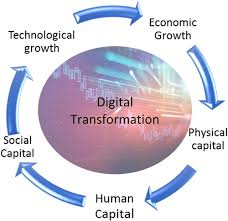Training course on Digitalization and Economic Development: Leveraging Digital Technologies for Transformation
Training Course on Digitalization and Economic Development: Leveraging Digital Technologies for Transformation will equip participants with the insights and tools necessary to leverage digitalization for sustainable economic development.
Skills Covered

Course Overview
Training Course on Digitalization and Economic Development: Leveraging Digital Technologies for Transformation
Digitalization has emerged as a transformative force in economic development, offering unprecedented opportunities for growth, innovation, and efficiency. By integrating digital technologies into various sectors, developing countries can enhance productivity, improve service delivery, and foster inclusive growth. This transformation not only facilitates access to information and markets but also empowers individuals and businesses to participate in the global economy. However, the journey toward digitalization presents challenges, including infrastructure gaps, digital divides, and the need for skill development. Understanding these dynamics is essential for stakeholders aiming to harness the benefits of digital technologies effectively.
To navigate the complexities of digital transformation, a strategic approach is required, focusing on investments in technology, education, and regulatory frameworks. By fostering a conducive environment for digital innovation, developing countries can unlock new economic opportunities and improve the quality of life for their citizens. Training Course on Digitalization and Economic Development: Leveraging Digital Technologies for Transformation will equip participants with the insights and tools necessary to leverage digitalization for sustainable economic development.
Course Objectives
- Understand the role of digitalization in economic development.
- Identify key digital technologies driving transformation.
- Analyze the impact of digitalization on various sectors.
- Evaluate challenges in implementing digital solutions.
- Master strategies for fostering digital innovation.
- Explore the importance of data and analytics in decision-making.
- Assess the role of public policy in promoting digitalization.
- Develop skills for managing digital transformation projects.
- Communicate effectively with stakeholders in the digital economy.
- Utilize case studies to learn from successful digital initiatives.
- Identify future trends in digital technologies and their implications.
- Foster an inclusive approach to digital transformation.
- Prepare for the impact of cybersecurity on digital initiatives.
Target Audience
- Policymakers and government officials
- Business leaders and entrepreneurs
- Development practitioners
- IT professionals and digital strategists
- Economists and researchers
- Educators and trainers
- Non-profit organization representatives
- Graduate students in economics and technology
Course Duration: 5 Days
Course Modules
Module 1: Introduction to Digitalization
- Overview of digital transformation concepts.
- Historical context of digital technologies.
- Importance of digitalization in economic growth.
- Key players in the digital economy.
- Case studies of successful digital initiatives.
Module 2: Key Digital Technologies
- Exploring emerging technologies (AI, IoT, blockchain).
- Role of mobile technology in economic development.
- Digital platforms and their economic impact.
- Assessing the potential of big data analytics.
- Case studies of technology applications in various sectors.
Module 3: Impact on Economic Sectors
- Analyzing digitalization in agriculture, manufacturing, and services.
- Enhancing productivity through digital tools.
- The role of e-commerce in market access.
- Improving healthcare delivery through digital solutions.
- Case studies showcasing sector-specific transformations.
Module 4: Challenges of Digital Transformation
- Identifying infrastructure and connectivity gaps.
- Addressing the digital divide among populations.
- Navigating regulatory and policy barriers.
- Managing resistance to change within organizations.
- Learning from case studies of challenges encountered.
Module 5: Fostering Digital Innovation
- Strategies for promoting a culture of innovation.
- Role of startups and entrepreneurship in digitalization.
- Collaborating with tech hubs and incubators.
- Assessing funding opportunities for digital projects.
- Case studies of innovative practices in different contexts.
Module 6: Data and Decision-Making
- Importance of data-driven decision-making.
- Tools for data collection and analysis.
- Understanding data privacy and ethical considerations.
- Utilizing data analytics for business growth.
- Case studies on effective data usage.
Module 7: Public Policy and Digitalization
- Role of government in facilitating digital transformation.
- Developing regulatory frameworks for digital innovation.
- Promoting public-private partnerships in technology.
- Evaluating the impact of digital policies on economic growth.
- Case studies of successful policy implementations.
Module 8: Cybersecurity and Digital Initiatives
- Understanding cybersecurity threats and risks.
- Implementing best practices for data protection.
- Building resilience against cyber attacks.
- Assessing the impact of cybersecurity on digital projects.
- Case studies on managing cybersecurity challenges.
Training Methodology
- Interactive Workshops: Facilitated discussions, group exercises, and problem-solving activities.
- Case Studies: Real-world examples to illustrate successful community-based surveillance practices.
- Role-Playing and Simulations: Practice engaging communities in surveillance activities.
- Expert Presentations: Insights from experienced public health professionals and community leaders.
- Group Projects: Collaborative development of community surveillance plans.
- Action Planning: Development of personalized action plans for implementing community-based surveillance.
- Digital Tools and Resources: Utilization of online platforms for collaboration and learning.
- Peer-to-Peer Learning: Sharing experiences and insights on community engagement.
- Post-Training Support: Access to online forums, mentorship, and continued learning resources.
Register as a group from 3 participants for a Discount
Send us an email: info@datastatresearch.org or call +254724527104
Certification
Upon successful completion of this training, participants will be issued with a globally recognized certificate.
Tailor-Made Cours
We also offer tailor-made courses based on your needs.
Key Notes
- Participants must be conversant in English.
- Upon completion of training, participants will receive an Authorized Training Certificate.
- The course duration is flexible and can be modified to fit any number of days.
- Course fee includes facilitation, training materials, 2 coffee breaks, buffet lunch, and a Certificate upon successful completion.
- One-year post-training support, consultation, and coaching provided after the course.
- Payment should be made at least a week before the training commencement to DATASTAT CONSULTANCY LTD account, as indicated in the invoice, to enable better preparation.